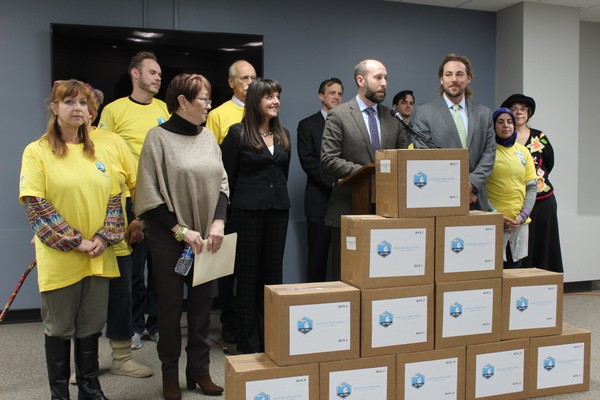The state will try to limit illegal cannabis operators in California. Here’s what else we should expect in the coming months.
For state-by-state legalization to succeed, state and local governments often need to take significant enforcement measures against “gray market” cannabis operators to ensure an even playing field for licensed operators who face the financial pinch and responsibility of comprehensive licensing regulations and robust taxation.
To date, each state with an existing, unregulated medical cannabis industry has taken action to make sure unlicensed, unregulated medical cannabis operators do not undermine or disenfranchise their otherwise licensed counterparts (see Washington State as a prime example, or the continuing legislative efforts in Oregon).
In 1996, California became the first state to adopt medical marijuana legislation and that also makes it the state with the longest reigning gray marijuana marketplace.
Under California’s Compassionate Use Act of 1996 (“CUA”), qualified patients and their caregivers have been using closed-loop, non-profit cooperatives and collectives to provide consistent access to cannabis for medical use.
These cooperatives and collectives (and their members) enjoy immunity from state law criminal prosecution so long as they comply with the CUA. Since 1996, these collectives and cooperatives have operated under a gray area of the law — mostly according to this 2008 state attorney general memo.
Each California city and county has treated these collectives and cooperatives differently. Though not every CUA collective or cooperative is engaged in illegal commercial cannabis activity, this legal gray area has allowed many CUA collectives and cooperatives to engage in outright illegal conduct, including selling cannabis for a profit, tax evasion, and diverting cannabis over state lines.
With California’s 2017 passage of the Medicinal and Adult-Use Cannabis Regulation and Safety Act (“MAUCRSA”), California now has laws that comprehensively regulate and tax licensed cannabis businesses engaged in commercial cannabis activity.
Existing CUA collectives and cooperatives that still engage in mass, unregulated wholesale and retail commercial operations threaten to undermine participation in California’s MAUCRSA marketplace and California is now taking steps to stop the unlicensed and illegal sale of cannabis within its borders, including by CUA collectives and cooperatives.
California does not have much choice but to tolerate the CUA collective model through early 2019 because MAUCRSA preserves the criminal immunity of CUA collectives and cooperatives for up to one year after the first MAUCRSA licenses begin to issue.
The MAUCRSA drop-dead date on those collectives and cooperatives is now January 9, 2019, giving CUA collectives and cooperatives at least 10 more months to operate in the legally gray marketplace. This though has not stopped the California Bureau of Cannabis Control from targeting those CUA collectives and cooperatives that openly engage in unlicensed commercial cannabis activity.
California has started sending cease-and-desist letters to unlicensed CUA collective and cooperative operators believed to be engaging in commercial cannabis activity that violates MAUCRSA.
It has also started cracking down on ancillary advertisers,like Weedmaps, for promoting unlicensed operators and their products in violation of MAUCRSA marketing and advertising restrictions.
These will not be the last efforts we see on behalf of the state to try to limit illegal cannabis operators in California. Here’s what else we should expect in the coming months:
- Industry self-policing. It’s unlikely licensed cannabis operators under MAUCRSA are going to allow CUA collectives and cooperatives to take away their market share and/or to conduct sales of cannabis without facing the same onerous state and local taxes as licensees. I predict there will be a spike in legal cannabis businesses reporting on unlicensed CUA collectives and cooperatives violating the CUA and/or MAUCRSA.
- Increased scrutiny of ancillary businesses. Going after Weedmaps represents the state’s willingness to chase third parties that may be directly or indirectly assisting illegal operators. We should expect consultants, landlords, equipment sellers/lessors, and others who assist unlicensed operators in violating MAUCRSA will feel the same heat as Weedmaps.
- Policing of attorneys. Yes, there are still attorneys forming CUA collectives and cooperatives with the sole purpose of helping their clients evade MAUCRSA licensing to make one last stream of profit before 2019 (see here for more of the “unique” legal advice that has come out of California’s cannabis industry in past years). At this point, if helping a company start a CUA collective or cooperative to engage in the commercial cultivation, manufacture, distribution, and/or sale of cannabis in California, is almost certainly unethical conduct and it likely constitutes malpractice as well.
- Getting local governments involved. Half the problem with current CUA collectives and cooperatives violating MAUCRSA is that local laws still allow them to operate in a completely gray area. Sometimes, local governments have not even adopted local regulations under MAUCRSA, but they still have and maintain existing laws allowing for CUA collectives and cooperatives. State regulators would be wise to dialogue with local governments about CUA collectives and cooperatives acting in violation of MAUCRSA. Otherwise, many collectives and cooperatives will have free reign under local law to continue violating the CUA and MAUCRSA through January of next year.
- Federal intervention. If CUA operators ignore state mandates to cease commercial cannabis activities, there is a decent chance state regulators (and local governments) will call on U.S. prosecutors to assist in sweeps. Given Sessions’s rescinding of the Cole Memo in January, U.S. Attorneys are going to act in accordance with the resources and priorities of their districts. If local and state governments demand federal law enforcement action regarding MAUCRSA violations, we can expect more arrests and prosecutions from the Feds.
credit:420intel.com









